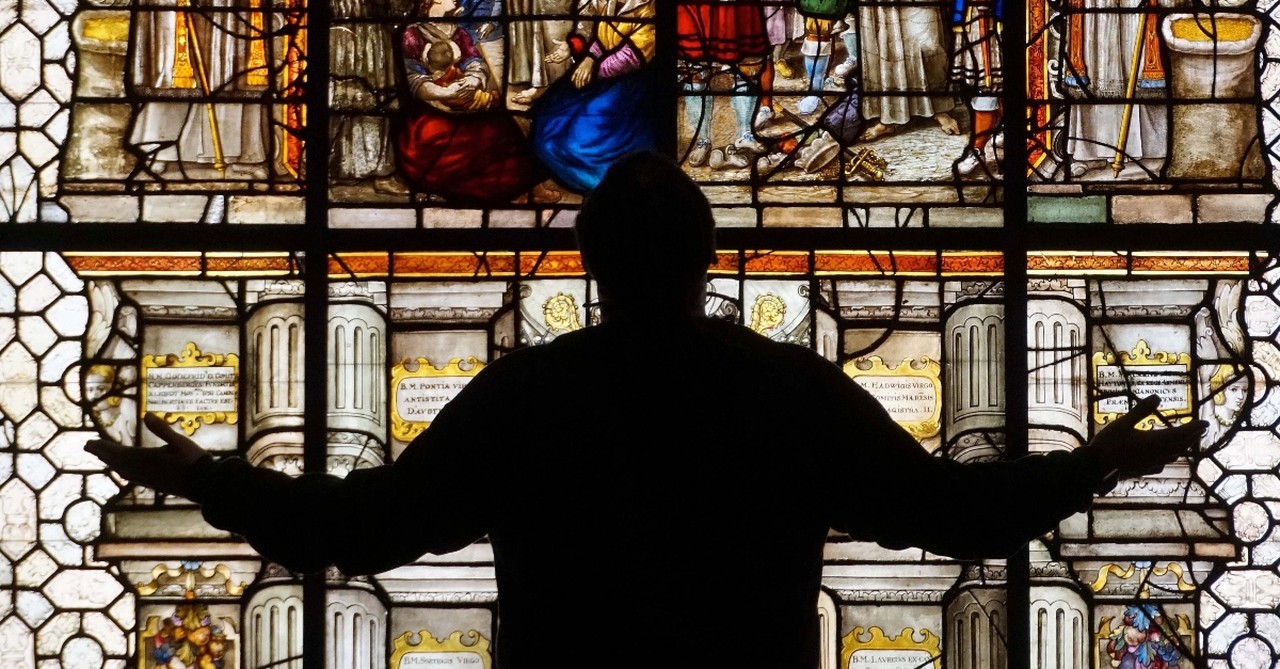What Exactly is Worship According to the Bible?

Worship can be defined as “the reverence or adoration that one shows toward something or someone; holding a person or object in high esteem; or giving a person or an object a place of importance or honor.” There are hundreds of scriptures in the Bible that speak about worship and provide guidance as to both who and how to worship.
It is a Biblical mandate that we worship God and Him alone. It is an act that is designed not only to bring honor to Him who deserves honor, but also to bring a spirit of obedience and submission to the worshippers.
But why do we worship, what exactly is worship and how do we worship on a day-to-day basis? Because this topic is important to God and is the reason that we were created, the Scripture provides us a great deal of information on the subject.
Photo credit: Unsplash/Chris Malinao Burgett
What Is Worship?

What Is Worship?
SLIDE 1 OF 6
The word worship comes from the Old English word “weorþscipe” or “worth-ship” which means “to give worth to.” In a secular context, the word can mean “to hold something in high esteem.” In a Biblical context, the Hebrew word for worship is shachah, which means to depress, to fall down, or to lay prostrate before a deity. It is to hold something up with such reverence, honor, and esteem that your only desire is to bow down before it. God specifically mandates that the focus of this type of worship be toward Him and Him alone.
In its earliest context, man’s worship to God involved an act of sacrifice – the slaughter of an animal and the shedding of blood in order to bring atonement for sin. It was the looking ahead to the time when Messiah would come and become the ultimate sacrifice, giving the ultimate form of worship in obedience to God and love for us through the giving of himself in his death.
But Paul reframes sacrifice as worship in Romans 12:1, “Therefore, brothers, by the mercies of God, I urge you to present your bodies as a living sacrifice, holy and pleasing to God; this is your spiritual worship.” We are no longer under bondage to the law, with the burden of bringing animal blood to atone for sins and as our form of worship. Jesus has already paid a death price and made a blood sacrifice for our sins. Our form of worship, post-resurrection, is to bring ourselves, our own lives, as a living sacrifice to God. This is holy and pleasing to Him.
In My Utmost for His Highest Oswald Chambers said, “Worship is giving God the best that He has given you.” We own nothing of worth to present to God in worship but ourselves. It is our ultimate sacrifice, giving God back the very life that He gave to us. It is our purpose and the reason we were created. 1 Peter 2:9 says that we are a “chosen people, a royal priesthood, a holy nation, God’s special possession, that you may declare the praises of Him who called you out of darkness into His wonderful light.” It is the reason that we exist, to bring adoration to Him who created us.
Photo credit: Unsplash/Mark Pan4ratte
4 Biblical Commands about Worship

4 Biblical Commands about Worship
SLIDE 2 OF 6
The Bible speaks of worship from Genesis to Revelation. The Bible in its entirety is consistent and clear as to God’s plan for worship and clearly outlines a command, a focus, a reason, and a way to worship. Scripture is explicit in our worship in the following ways:
1. Commanded to Worship
Our command is to worship because God created man for that purpose. Isaiah 43:7 tells us that we were created to worship Him: “everyone who is called by my name, whom I created for my glory, whom I formed and made.”
The author of Psalm 95:6 tells us to “Come, let us bow down in worship, let us kneel before the Lord our Maker.” It is a command, something that is to be expected from the creation to the Creator. And if we do not? Luke 19:40 tells us that the stones will cry out in worship to God. Our worship is just that important to God.
2. Focus of Worship
The focus of our worship is without a doubt to God and Him alone. In Luke 4:8 Jesus answered, “It is written: ‘Worship the Lord your God and serve Him only.” Even during the time of animal sacrifice, pre-resurrection, God’s people were reminded of who He was, the mighty miracles that He had performed on their behalf, and the mandate to a monotheistic form of worship through sacrifice.
2 Kings 17:36 says that “the Lord, who brought you up out of Egypt with mighty power and outstretched arm, is the one you must worship. To Him you shall bow down and to Him offer sacrifices.” There is no other option but to worship God.
Photo credit: ©Getty Images/Wenping-Zheng
3. The Reason We Worship

3. The Reason We Worship
SLIDE 3 OF 6
The reason we worship? Because He alone is worthy. Who or what else is more worthy than the deity who created all heaven and earth? He holds time in His hand and sovereign watch over all of creation. Revelation 4:11 tells us that, “You are worthy, our Lord and God, to receive glory and honor and power, for You created all things, and by Your will they were created and have their being.”
The prophets of the Old Testament also proclaimed the worthiness of God to those who followed Him. After being given a child in her barrenness, Hannah in 1 Samuel 2:2, declared to the Lord through her prayer of thanksgiving, “There is no one holy like the Lord; there is no one besides You; there is no Rock like our God.”
4. How We Worship
Post resurrection, the Bible is not specific in describing the steps that we should use to worship Him, with one exception. John 4:23 tells us that “The hour is coming, and now is, when the true worshipers will worship the Father in spirit and truth, for the Father is seeking such to worship Him.”
God is a spirit and 1 Corinthians 6:19-20 tells us that we are filled with His spirit: “Do you not know that your bodies are temples of the Holy Spirit, who is in you, whom you have received from God? You are not your own; you were bought at a price. Therefore honor God with your bodies.”
We are also commanded to bring Him worship that is based in truth. God sees our heart and the reverence that He seeks is one that comes from a clean heart, one made holy through being forgiven, with a correct motive, and with one purpose – to honor Him.
Photo credit: ©Getty Images/Lordn
Is Worship Just Singing?

Is Worship Just Singing?
SLIDE 4 OF 6
Our modern day church services typically hold times for both praise and worship. In fact the Bible places a great importance on the musical expression of our faith, love and adoration for God. Psalm 105:2 tells us to “Sing to him, sing praise to him; tell of all his wonderful acts” and God adores our praise through singing and music. Typically the praise time of a church service is usually the more up beat, lively part of the song service with the worship time being the more somber quiet reflective time. And there is a reason.
The difference between praise and worship is in its focus. To praise is to thank God for things He has done for us. It is an outward showing of thanksgiving for an active showing of God. We praise God through music and singing for “all of his wonderful acts” that He has done for us.
But worship, on the other hand is a time to revere, to adore, to honor, and pay homage to God, not for what He has done but for who He is. He is Jehovah, the great I Am (Exodus 3:14); He is El Shaddai, the Almighty (Genesis 17:1); He is the Exalted, who is transcendent far above the universe (Psalm 113:4-5); He is the Alpha and Omega, the beginning and the end (Revelation 1:8). He is the only God, and apart from Him there is no other (Isaiah 45:5). He is worthy of our adoration, our reverence, and our worship.
But the act of worship is much more than just singing. The Bible describes several different approaches to worship. The Psalmist tells us in Psalm 95:6 to bow down and kneel before the Lord; Job 1:20-21 describes Job worshipping by tearing his robe, shaving his head and falling prostrate on the ground. At times we are to bring an offering as a method to worship as in 1 Chronicles 16:29. We also worship God through prayer using our voice, our stillness, our thoughts, our motives, and our spirit.
Even though Scripture does not outline specific methods that we are commanded to use in our worship, there are incorrect motives and attitudes to worship. It is an act of the heart and a reflection of the state of our heart. John 4:24 tells us that we “must worship in spirit and in truth.” We are to come to God, holy and acceptable with a clean heart free from impure motives, which is our “spiritual worship” (Romans 12:1). We are to come to God, in true reverence and without pride because only He is worthy (Psalm 96:9). We come with reverence and with awe. This is our acceptable worship as is told in Hebrews 12:28: “Therefore, since we are receiving a kingdom that cannot be shaken, let us be thankful, and so worship God acceptably with reverence and awe.”
Photo credit: ©Getty Images/monkeybusinessimages
Why Does the Bible Warn against Worshipping the Wrong Things?

Why Does the Bible Warn against Worshipping the Wrong Things?
SLIDE 5 OF 6
The Bible contains several direct warnings about the focus of our worship. In the book of Exodus, Moses provided the children of Israel with the first commandment, and it deals with who should be the recipient of our worship. Exodus 34:14 tells us that we are “not to worship any other god, for the Lord, whose name is Jealous, is a jealous God.”
The definition of an idol is “anything that is greatly admired, loved, or revered.” An idol can be a living being, or it can be an object. In our modern world it may show up as a hobby, an activity, money or even having a narcissistic view of ourselves, putting our own wants and needs in front of God.
In Hosea chapter 4, the prophet describes idol worship as spiritual adultery to God. The unfaithfulness of worshipping something other than God will bring about divine anger and retribution.
In Leviticus 26:1, the Lord commands the children of Israel, “not to make idols or set up an image or a sacred stone for yourselves, and do not place a carved stone in your land to bow down before it. I am the Lord your God.” Even in the New Testament, 1 Corinthians 10:22 speaks of not arousing the jealousy of God by worshipping idols and involving yourselves in pagan worship.
Even though God is not specific about the method to our worship and gives us the freedom we need to express our adoration, He is very direct about who we are not to worship.
Photo credit: ©Getty Images/Splash of Photography
How Can We Worship God Throughout Our Week?

How Can We Worship God Throughout Our Week?
SLIDE 6 OF 6
Worship is not a one-time act that is to be done in a certain religious location on a designated religious day. It is a matter of the heart. It is a way of life. Charles Spurgeon said it best when he said, “All places are places of worship to a Christian. Wherever he is, he ought to be in a worshiping frame of mind.”
We worship God all during the day for who He is, remembering His omnipotent, omniscient holiness. We have faith in His wisdom, His sovereign strength, power, and love. We walk out our worship with our thoughts, our words, and our actions.
We wake up thinking about the goodness of God in allowing us another day to live, bringing honor to Him. We get on our knees in prayer, offering our day and ourselves to Him alone to do as He pleases. We are quick to turn to Him because we are walking beside Him in everything we do and with unceasing prayer.
We give the only thing God wants: we give ourselves.
The Privilege of Worship
A.W. Tozer said, "The heart that knows God can find God anywhere ... a person filled with the Spirit of God, a person who has met God in a living encounter, can know the joy of worshipping Him, whether in the silences of life or in the storms of life."
To God our worship brings the honor that is due to His name but to the worshipper, it brings joy through total obedience and submission to Him. It is not only a mandate and an expectation but it is also an honor and privilege to know that an all-powerful God wants nothing more that our adoration.
Sources
Chambers, O. (2005). My Utmost for His Highest. Discovery House Publishers.
Spurgeon, C. H. (1988). “Spurgeon at His Best: Over 2200 Striking Quotations from the World's Most Exhaustive and Widely-read Sermon Series”, Baker Publishing Group.
Strong, J. (1890). Strong's exhaustive concordance of the Bible. Abingdon Press.
Tozer, A. W. (2012). Whatever Happened to Worship. Wingspread; New Edition.
Photo credit: ©Getty Images/monkeybusinessimages

Originally published September 14, 2020.









